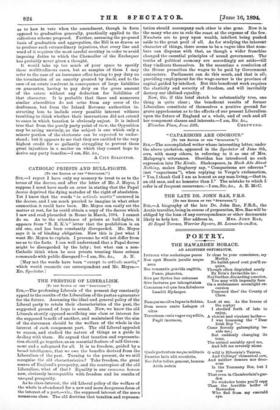THE PRESTIGE OF LIBERALISM.
[TO THE EDITOR OF THE "SPECTATOR."]
SIR,—The professing Liberals of the present day constantly appeal to the results of the Liberalism of the pastas a guarantee for the future. Assuming the ideal and general policy of the Liberal party to retain their characteristics of the past, the suggested ground of hope is sound. Now, we know the old Liberals stoutly opposed sacrificing one class or interest for the supposed benefit of another, and maintained that the aim of the statesman should be the welfare of the whole in the interest of each component part. The old Liberal appealed to reason, and studied the nature of things as a guide in dealing with them. He argued that taxation and representa- tion should go together, as an essential feature of self-Govern- ment and a safeguard for all. It is to freedom, guided by a broad intelligence, that we owe the benefits derived from the Liberalism of the past. Turning to the present, do we still recognise the old characteristics ? Take freedom, the great source of England's prosperity, and the centrepiece of the old Liberalism, what of that ? Equality is our summum bonum now, obviously incompatible with freedom and its results of unequal prosperity.
As to class-interest, the old Liberal policy of the welfare of the whole is abandoned for a new and more dangerous form of the interest of a part,—viz., the supposed interest of the mote numerous class. The old doctrine that taxation and represen-
tation should accompany each other is also gone. Now it is the many who are to rule the roast at the expense of the few. Numbers are to prey upon wealth, intellect being pushed aside to the great peril of all. As for studying the inherent character of things, there seems to be a vague idea that num- bers can dispense with that, as though a wider franchise changed the essential principles of sound government. The truths of political economy are accordingly set aside—till they vindicate themselves. In the meantime a resolution of the House prescribes the wages to be paid by Government contractors. Parliament can do this much, and that is all; providing employment for the wage-earner is the province of capital guided by intellect. But this beneficent work requires the elasticity and security of freedom, and will inevitably destroy our idolised equality.
Now, Sir, if this brief sketch be substantially true, one thing is quite clear ; the beneficent results of former Liberalism constitute of themselves a positive ground for grave apprehension as to the effects of our present Liberalism. upon the future of England as' a whole, and of each and all her component classes and interests.—! am, Sir, Sic.,


































 Previous page
Previous page